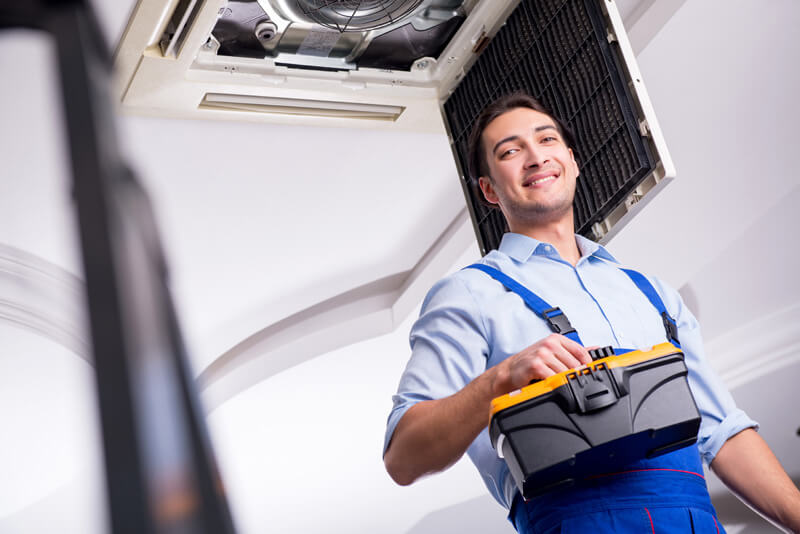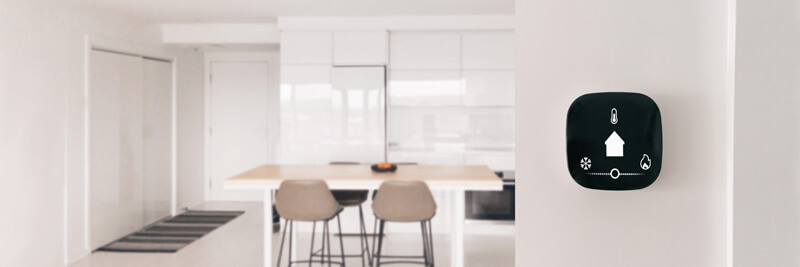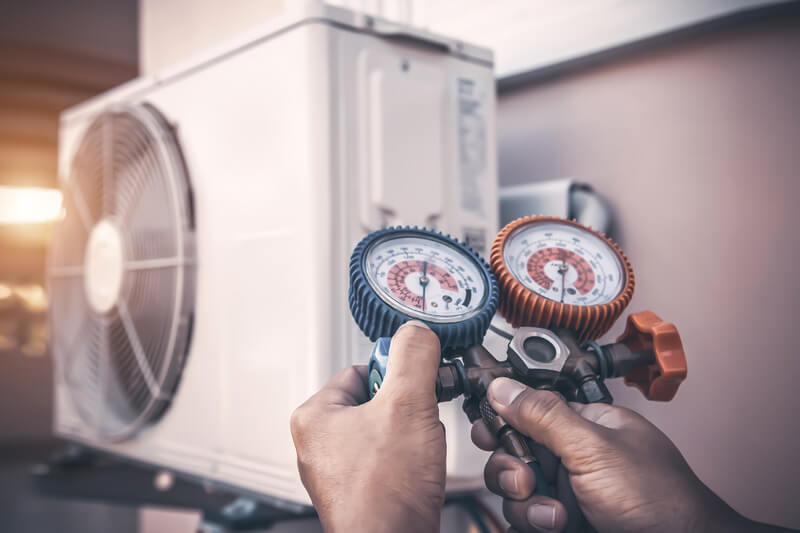
When you are upgrading or replacing the heating or cooling system in your home, you need to know how to choose the right heat pump based on its power and energy efficiency.
We are told to choose based on BTU, SEER, HSPF, EER, and COP. But what do all these terms really mean when buying a wall-mounted, multi-zone, or central heat pump?
At Compare HVAC, we help you find the right system for your heating and cooling needs with FREE and NO-OBLIGATION quotes from our reputable HVAC partners.
You can compare multiple quotes, ask questions and advice from HVAC experts in your area, and save time and money!
Fill out the short online form on this page and get the best heat pump for your home at affordable prices!
How powerful is a heat pump?

The number of BTU is the unit of measurement of the power of a heat pump. BTU is an acronym that stands for “British Thermal Unit”.
In heating mode, this unit of measurement corresponds to the energy produced in the form of heat.
It is, in fact, the heat (energy) required to raise the temperature of one (1) pound of water by one (1) degree Fahrenheit (0.56 o C) when the atmospheric pressure is compliant (101.3 kPa).
The acronym BTU/h (BTU per hour) is a unit that specifies the cooling capacity supplied for one (1) hour by an air conditioner operating at maximum capacity.
Wall-mounted heat pumps are designed to provide power varying between 9,000 and 18,000 BTU/h. In Quebec, the most popular models usually have a capacity of 12,000 BTU/h.
However, specialists recommend not to automatically associate the surface area of your home with the heating or cooling capacity of your heat pump.
Get in touch with heat pump specialists from Compare HVAC if you want to know the right heat pump most suitable for your home.
The energy efficiency of the heat pump
Energy efficiency is one of the most important factors to consider when buying a heat pump.
This is because it gives you the possibility of taking advantage of government subsidies depending on the device you choose.
This is measured by its SEER (seasonal energy efficiency rating) for an air conditioning system.
For wall units, the Natural Resources Canada (NCR) certifies two (2) types of energy performance. The most common is the Seasonal Energy Efficiency Ratio (SEER; in French: TRÈS, for rate of seasonal energy efficiency).
This is the ratio between the cooling performance of the device (in BTU/h) and the energy consumed (Watt/h) to achieve it. Therefore, a heat pump with a high SEER rating will have better energy efficiency.
In Canada, all new heat pumps must meet a minimum SEER rating of 11.
To meet the requirements of the Energy Star program, the SEER rating must be 14 or higher.
The maximum SEER rating that a heat pump can provide in cooling mode is 37.5
EER Air conditioning of an air conditioning system
The energy efficiency ratio (ERR), more commonly known by the acronym EER (Energy Efficiency Ratio) is established according to standards for outdoor temperature (35o C), indoor temperature (26o C), and humidity (50%) standard.
Thus, regardless of the average temperature in your region during the summer season, the EER provides real information about the general cooling performance of the heat pump.
EER is mainly used by air conditioning technicians and engineers while SEER is used for marketing.
COP: the performance of an air conditioning and heating system
The COP (coefficient of performance) of a heat pump indicates the service provided by the motor of the compressor of a heat pump, both in heating mode and in cooling mode.
The units of measurement of the heat pump in cooling mode (BTU/h) and in heating mode (BTU) are converted into a single unit of measurement, the Kw/h.
For example, a heat pump with a COP of 3.5 will supply 3.5 Kw/h of hot or cold air for an electrical expenditure of 1 Kw/h.
At the moment, the maximum COP from a heat pump is 7.
HSPF: the energy efficiency of a heating system
The term HSPF stands for “Heating and Seasonal Performance Factor”. In French, it is referred to as “Facteur de Rende pour la Saison de Heating” (FRSC) but it is not generally used.
More specifically, the HSPF factor reveals the energy efficiency of a heat pump in a heating mode. It is the ratio between the quantity of heat emitted and the amount of energy expended to produce it.
In Quebec, heat pumps are used for heating much longer than for cooling during the year. In such a case, the HSPF rating should be the primary concern, although the SEER factor is still considered important.
The higher the HSPF, the higher the efficiency of the heat pump and less electricity is consumed by the device for heating the home.
The HSPF of each heat pump is displayed on the Energy Guide label of the device or in the manufacturer’s leaflet.
It is advisable to choose a heat pump whose power (BTU) suits the needs of your home and with SEER and HSPF coefficients that are high enough for better energy efficiency in cooling and heating mode.
Tailor your choice of heat pump to your needs

The heat pump you choose must be based on several factors:
- How many floors does your house have?
- Do you have an open concept for the kitchen and living room?
- Is the insulation of good quality?
- What is the size of the area to be heated or cooled?
- How high are the ceilings?
If your home has several windows facing south, the passive heat created by sunshine in the summertime as well as in the winter is a factor that must also be taken into consideration.
Some exterior characteristics are also accounted for.
This includes the possible location for the outdoor unit. If you prioritize heating, installing your heat pump on the south wall of your home would be a good idea.
In contrast, if air conditioning is your priority, your heat pump will perform better if the outdoor unit is attached to the north wall of your home.
Our reliable partners have the experience and expertise to accurately determine the efficiency and power of the heat pump that will work best for your home.
By choosing the right heat pump, you can reduce the cost of your heating and cooling and take advantage of the best performance from your HVAC system.
Furnace vs. Heat Pump: Which one do you need?
Are you torn between using a furnace or a heat pump for your home? Know that these two types of residential heating systems are vastly different. While a heat pump does not generate heat, it draws heat from outdoor air and distributes the heat inside your home.
A furnace, on the other hand, using a heat source and a combustion process to produce heat. It can use fuel like oil or natural gas to produce hot air.
If you use a gas furnace, it will utilize a heat exchanger, a burner, a blower fan, and a flue for expelling exhaust.
Which one is better for your home? All homeowners want a cost-effective, efficient, and eco-friendly heating system that will last long. Both a furnace and a heat pump checks the boxes but at different levels.
Heat from a gas furnace is drier and hotter and whatever the temperature outdoor, it will produce the heat you need. In contrast, a heat pump uses humid air from outdoors which has limitations such as if the outdoor temperature dips to -28° Celsius. In this case, a back-up heating source will be needed.
But then, you need to remember that a heat pump can also cool your home in the summer. For homes without ductwork, a ductless mini-split system will be the best option.
Speak to one of our partners so you can get all the information you need to help you decide. Just fill out the short online form on this page to get connected to the best HVAC experts in your area.
FAQS on heat pump and heat pump installation

What is a cold climate heat pump?
A cold climate heat pump works even in Canadian winter. Keep in mind that even cold air has heat. A heat pump supplies heat to the home even during cold winter days. In above-freezing temperatures, it will cost less to operate a heat pump than other types of heating systems.
What temperature is too much for a heat pump to work?
A heat pump cannot function at maximum performance for temperatures 25 to 40 degrees Fahrenheit. The most efficient temperature for a teat pump to work is when it is above 40. When the temperature below drops, the heat pump loses some efficiency and uses more energy to work.
Is a heat pump installation expensive?
Heat pumps cost more to install than a gas system but keep in mind that there may be grants or subsidies available in your area. Check with a reliable HVAC contractor in our network to get accurate quotes for a heat pump installation. Over time, heat pumps can save money and recover your investment.
Is a heat pump recommended for any type of home?
If your home has issues with insulation and your budget is small, it may not be advisable to get a heat pump installed. It is better to resolve insulation problems so that any type of heating system with work at maximum capacity.
The heat pump needs space for its outdoor unit. It is not advisable if there is no appropriate space for the outdoor unit to be located.
Is a heat pump noisy?
The outdoor unit may produce noise that is similar to the external units of air conditioners. However, inside the home, the heat pump will not be any noisier than an air conditioner.
Is a heat pump better than a furnace?
Furnaces burn oil or gas to generate heat. On the other hand, heat pumps transfer heat from outdoor air (even cold) air to heat your home. They produce less heat than furnaces. Heat pumps also don’t work as efficiently in freezing temperatures.
What is the lifespan of a heat pump?
Air-source heat pumps can last 15 to 20 years. New models on the market may last longer. Good maintenance is the key to prolonging the lifespan of your heat pump.
How much does it cost to install a heat pump?
A heat pump replacement costs an average of $5,000 to $12,500. This depends on the size and sophistication of the heat pump model and the heat pump contractor you choose.
What are reliable heat pump brands today?
Some of the proven brands of heat pumps include Armstrong, Bryant, Payne, Carrier, American Standard, and Lennox, among others.
What maintenance is required by heat pumps?
You need to have ducts, filters, indoor coil, and blower checked and possible duct leakage repaired. It also needs to be checked for refrigerant and airflow. You can have a maintenance check done to get it ready for winter in autumn and checked in spring to get it ready for the summer.
Compare 3 Heat Pump Prices to save money
Enjoy a comfortable home today with a stable temperature while reducing your energy consumption.
You can save on your electricity costs and reduce your energy footprint by working with any one of our HVAC partners in your area.
By completing the online request form below, you are sure to be advised by a heat pump specialist on the power and energy efficiency of the heat pump that will suit your home.
Obtain free and no-obligation quotes from experienced heat pump specialists in our network. Compare 3 quotes and choose the most advantageous offer that suits your needs and budget.
For heat pumps, boilers, furnaces, and air-conditioners, our partners can help you find the best solutions for your cooling and heating needs.
Please note that our site does not sell heat pumps. We have gathered the best HVAC contractors and professionals under our network so you can have quick access to HVAC products and services anywhere in Ontario and Quebec.



